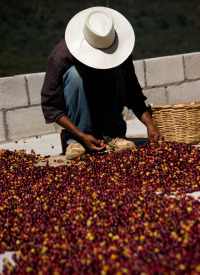 THIOTTE, Haiti — Connoisseur Osier Jean steps into the sterile room, pauses and clears his mind.
THIOTTE, Haiti — Connoisseur Osier Jean steps into the sterile room, pauses and clears his mind.
With notebook and flavor wheel in hand, he quickly turns to the task at hand — checking the quality.
He sniffs, slurps and swirls, allowing his senses to take in the richness.
The liquid is not wine, but caffeine rich Kafe Kreyòl, Haitian coffee. It is the country’s latest effort to revive a once-flourishing industry that has been crippled by decades of deforestation, political chaos and crises.
For years, bitter poverty and plummeting coffee prices around the world have made it much more profitable for farmers to chop trees for charcoal, and invest in cash crops, rather than coffee cherries. Now, with coffee consumption up and a shrinking supply of beans worldwide driving up prices, Haitian coffee is once again becoming a hot commodity.
But the coffee renaissance has its critics who wonder whether this revival, propped up by foreign aid, can sustain itself after the money runs out.
“Our biggest resource is our coffee,” said Archange Mardi, 51, a local farmer in Thiotte, a mountain valley in the southeastern Belle Anse region where the lush landscape is lined with shaded coffee trees growing in back yards, small gardens and family-owned plots. “Before we didn’t understand; now we are beginning to.”
Farmers in Thiotte and other coffee producing regions here are gaining access to new global markets, like Italy and Japan, and fetching premium prices for their exported sun-dried coffee.
Quality beans from Gwo Chwal, a nearby mountain community known for producing one of Haiti’s best coffee beans, once sold for $.30 a pound. Today, Japanese roasters are buying it for $5.50.
“We have a demand that we can never satisfy,” said Robinson Nelson, a local coffee grower and manager of COOPCAB, a cooperative in Thiotte working with more than 5,000 coffee farmers in southeastern, Haiti.
The success isn’t just restricted to the southeast. Some 130 miles north, in the rural highland of Port-de-Paix, a smaller but similar coffee cooperative is also growing. This year, Café COCANO farmers are expecting to double exports of their organically grown coffee – already available on the Internet and in Italian espresso shops – to high end South Florida grocers.
“Haitian farmers can produce great coffee as long as there is an export chain that works and that can get them a fair price,” said Anthony Vinciguerra, director of St. Thomas University’s Center for Justice and Peace, which has been working with the 300 families who comprise the northwest Haiti coffee growers’ co-op for the past five years.
While the northwest farmers have been aided by the South Florida university’s students – they assist with everything from social media and marketing to finding new export markets as part of class assignments – in Thiotte, farmers have benefitted from the attention Haiti received after last year’s devastating earthquake.